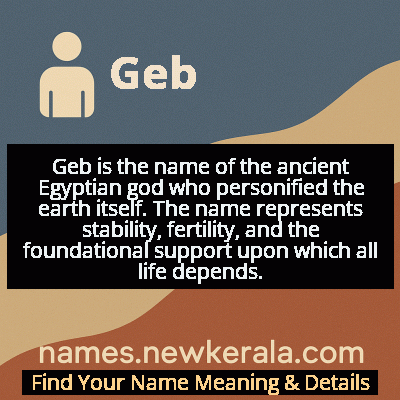Geb Name Meaning & Details
Origin, Popularity, Numerology Analysis & Name Meaning of Geb
Discover the origin, meaning, and cultural significance of the name GEB. Delve into its historical roots and explore the lasting impact it has had on communities and traditions.
Name
Geb
Gender
Male
Origin
Egyptian
Lucky Number
5
Meaning of the Name - Geb
Geb is the name of the ancient Egyptian god who personified the earth itself. The name represents stability, fertility, and the foundational support upon which all life depends.
Geb - Complete Numerology Analysis
Your Numerology Number
Based on Pythagorean Numerology System
Ruling Planet
Mercury
Positive Nature
Adventurous, dynamic, curious, and social.
Negative Traits
Restless, impatient, inconsistent, prone to indulgence.
Lucky Colours
Green, white.
Lucky Days
Wednesday.
Lucky Stones
Emerald.
Harmony Numbers
1, 3, 9.
Best Suited Professions
Sales, marketing, travel, entertainment.
What People Like About You
Versatility, charisma, adventurous spirit.
Famous People Named Geb
Geb (Mythological)
Egyptian God
Primary deity of the earth, father of Osiris, Isis, Set, and Nephthys
Geb (Historical Reference)
Mythological Figure
Central figure in Egyptian creation myths and cosmic balance
Name Variations & International Equivalents
Click on blue names to explore their detailed meanings. Gray names with will be available soon.
Cultural & Historical Significance
Geb's role extended beyond mere physical representation; he was considered the 'father of the gods' through his children Osiris, Isis, Set, and Nephthys. This paternal position gave him authority in divine judgment and royal legitimacy, as Egyptian pharaohs were said to sit upon 'the throne of Geb.' His laughter was believed to cause earthquakes, and he was associated with fertility and vegetation. In the afterlife beliefs, Geb protected the dead within his earthly realm and was invoked in funerary texts to provide sustenance and protection for the deceased.
Extended Personality Analysis
Individuals named Geb are often perceived as grounded, stable, and nurturing - qualities directly drawn from the earth god's mythological attributes. They tend to exhibit a strong connection to nature and physical reality, with practical problem-solving abilities and a reliable, steadfast character. Like the earth that supports all life, people with this name often show protective instincts toward those they care about and possess an inherent generosity. Their stability makes them excellent foundations for relationships and projects, though they may sometimes be perceived as stubborn or resistant to change.
Beyond the surface stability, those named Geb often display deep wisdom and paternal qualities, reflecting the god's role as father of major deities. They typically have a strong sense of justice and tradition, valuing order and structure in their lives. Their connection to the earthly realm often manifests as practical intelligence, good business sense, and an appreciation for tangible results. While they may not be the most emotionally expressive individuals, their loyalty and reliability make them valued friends and partners who provide consistent support through life's challenges.
Modern Usage & Popularity
In contemporary times, Geb remains an uncommon but meaningful choice, primarily used by parents with interest in Egyptian mythology or seeking unique mythological names. The name sees occasional use in English-speaking countries, particularly among families of Egyptian heritage or those fascinated by ancient cultures. It has never reached mainstream popularity charts, maintaining its status as a distinctive and scholarly choice. Recent years have shown a slight increase in usage as mythological names gain traction, though it remains far less common than other Egyptian names like Osiris or Isis. The name is most likely to be encountered in academic circles, among mythology enthusiasts, or in creative works drawing from Egyptian themes.
Symbolic & Spiritual Meanings
Geb symbolizes the fundamental concept of foundation and sustenance - representing the earth as both physical support and source of life. Metaphorically, the name embodies stability, fertility, and the generative power of nature. It carries connotations of paternal protection and authority, reflecting the god's role as father of major deities and his association with royal legitimacy. The name also represents the interconnection between all living things through the earth that sustains them, suggesting themes of unity, nourishment, and the cyclical nature of life and death. As the ground that supports all existence, Geb symbolizes reliability, endurance, and the quiet strength that undergirds more visible achievements.

